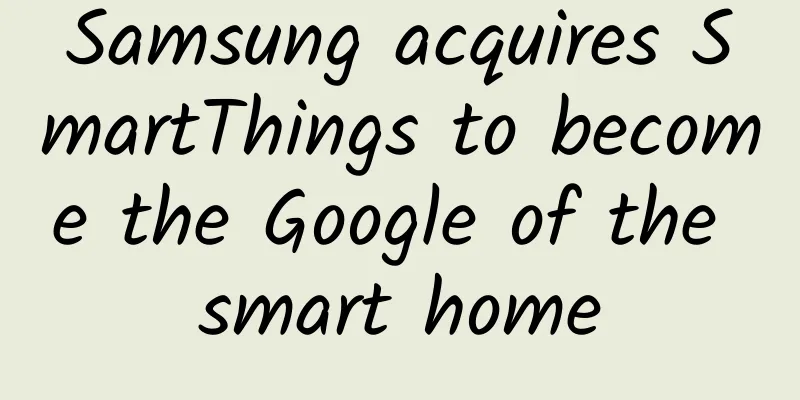Samsung acquires SmartThings to become the Google of the smart home

|
With the decline of old mobile phone giants, Samsung has been dominating the smartphone industry for many years, and its influence has even extended to the tablet market where there are extremely concentrated products such as iPad. Even with such achievements, some industry analysts still believe that Samsung's achievements are somewhat undeserved: the system level relies on Android, and the core hardware level is increasingly lacking its own elements. Samsung is likely to change people's perception of it in the future. According to the American technology blog Gizmodo, Samsung recently completed the acquisition of the emerging smart home company SmartThings for a total of US$200 million. After the two companies joined forces, Samsung's layout in the smart home industry finally surfaced. As one of the largest technology companies in the world, everyone is naturally familiar with Samsung, so what kind of company is SmartThings? Simply put, SmartThings was originally just a project on the Kickstarter crowdfunding platform, and SmartThings is not the only company that has set smart home as its development goal on this platform. The initial motivation of SmartThings founder Alex Hawkinson was just because of his dissatisfaction with his own home. In comparison, Nest, which was acquired by Google at the beginning of the year and is known as the "Apple of smart home", obviously looks much more "high-end". Samsung has its reasons for being interested in SmartThings. In the smart home industry, SmartThings focuses on sensor devices, and this aspect will have more opportunities to appear in the future. Among the products currently on sale, there is a $100 hardware "hub" that is well recognized by the market. This hub supports smartphone applications and cloud services and can connect thousands of electronic devices. At the same time, SmartThings also sells higher-priced kits that include various sensors and hardware devices that can be widely used for home security, temperature control, and water detection. "Sensor technology" is the direction that all smart home product companies are focusing on, but in addition, SmartThings is also building a smart home platform concept similar to Google's Android platform: an ecosystem built on smart home products. Perhaps it is this idea that is different from other smart home startups that has become the real reason why Samsung is interested in this startup. At present, 5,000 developers have used SmartThings' software to create applications that can run on various hardware combinations and play practical functions, such as health trackers used to detect users' diets and humidity sensors that monitor the status of houses. In the future, SmartThings also plans to launch more free or paid applications, and eventually create an "AppStore" in the smart home industry, just like Apple does on iOS. Samsung once wanted to make Android in its mobile devices unique and different, but with the iteration of Android versions, Google repeatedly emphasized and controlled the right to speak. It can be said that the Android system made Samsung successful, but also constrained Samsung. The free operating systems that Samsung can fully control, whether Bada or Tizen, have always encountered various setbacks and slow development. The smart mobile device market still has room for development, but product saturation is already high, and the smart home industry, which is gradually expanding its market coverage, seems to have given Samsung an opportunity to change its existing model. According to data from Strategy Analytics, a strategic analysis company, the hardware and service revenue of the smart home industry is expected to reach US$17.9 billion this year, and by 2019, this figure will grow to US$40 billion. On the other hand, even tech giants like Apple and Google, which have strong R&D and financial strength, are not ahead of the current market in terms of smart home development. Apple's HomeKit platform was only unveiled at the WWDC 2014 Apple Developer Conference this year, while Google, which has more experience in product cooperation, has only been acquiring Nest for less than five years. With the platform support brought by SmartTings, Samsung hopes to have the opportunity to be on par with other giants in the field of smart home in the future. Combined with Samsung's long-term accumulation of hardware and its "no shortage of money" style, Samsung's own ecosystem may appear in the world of smart home in the future. As a winner of Toutiao's Qingyun Plan and Baijiahao's Bai+ Plan, the 2019 Baidu Digital Author of the Year, the Baijiahao's Most Popular Author in the Technology Field, the 2019 Sogou Technology and Culture Author, and the 2021 Baijiahao Quarterly Influential Creator, he has won many awards, including the 2013 Sohu Best Industry Media Person, the 2015 China New Media Entrepreneurship Competition Beijing Third Place, the 2015 Guangmang Experience Award, the 2015 China New Media Entrepreneurship Competition Finals Third Place, and the 2018 Baidu Dynamic Annual Powerful Celebrity. |
<<: Four years later, MIUI6 starts to reduce the size of Xiaomi
>>: Using Internet logic to deal with the risk of online lending
Recommend
Living room entertainment leads smart home, ZIVOO Qingmang box triggers qualitative change in product experience
TV boxes, which were created to enhance the Inter...
Custom View-Imitate the reward button of the Hupu live broadcast game interface
As a senior basketball fan, I often use Hupu app ...
When you have insomnia or can’t sleep, does closing your eyes and “squinting” count as resting?
The cover image of this article comes from the co...
Why is watching TikTok addictive?
Although Douyin has launched an anti-addiction sy...
Pay attention to these 5 points when eating pickled cabbage safely! Hardcore content is coming!
Recently, because the 3.15 Gala exposed the probl...
Internet videos boost the popularity of TV boxes, but it is difficult to balance control and content
With the popularization of the Internet, more and...
There is no suspense about the new Macbook Pro. You just need to save money to buy it.
More than 20 days ago, Apple’s press conference o...
The box manufacturer said that the ban will be rectified and will not affect the use of the box
Recently, the State Administration of Radio, Film...
8 steps and 5 stages to build a private community SOP from 0 to 1
There is more and more consensus on doing private...
How can I tell the authenticity of the wine I bought for my dad?
Image source: Tuchong Creative How can I tell the...
The choice between light and heavy: Vancl’s seven-year cycle
If life could only be like the first time we met,...
User growth has undergone a qualitative change, from AARRR to RARRA!
Today, the topic I want to share with you is the ...
Do you really want the “half-disabled” Windows 10 S?
The theme of Microsoft's latest press confere...
"Health from Food" Series | Avoid bad habits to protect your liver
The liver is a very important organ in the human ...
Interview with Zhang Xinlei, community manager of Surround the Nervous Cat: The secret to the success of HTML5 games
[[121181]] On July 22, 2014, a game called Surrou...









